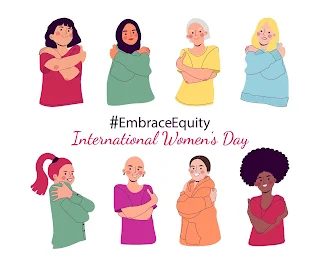Embrace Equity - International Women's Day 2023
 |
| Embrace Equity |
International Women’s Day is an important event celebrated
annually worldwide, honoring the contributions and achievements of women. This
year's theme, "Embrace Equity," highlights the need for gender
equality, particularly in Pakistan, where women face a myriad of challenges
daily. In this article, we'll discuss the struggles of Pakistani women, the
progress made so far, and how embracing equity can help promote gender
equality.
Pakistan is a country where patriarchal norms dominate
society, and women are often viewed as second-class citizens. Despite
comprising nearly half of the country's population, women are often denied
equal rights and opportunities, both at home and in the workplace. Women in
Pakistan are disproportionately affected by poverty, with limited access to
education, healthcare, and employment opportunities.
In recent years, there have been positive changes in
Pakistan regarding women's rights. The government has taken steps to promote
gender equality, and there is a growing movement of women's rights activists
pushing for change. However, gender equity is yet to be achieved.
One of the significant challenges facing Pakistani women is
access to education. According to a UNESCO report, Pakistan has one of the
lowest literacy rates globally, with only 40% of women able to read and write.
Without education, women are often forced into early marriages, and they are
unable to pursue careers or other opportunities that could help them achieve
financial independence.
Violence is another major issue facing women in Pakistan.
Violence against women is a widespread problem in Pakistan, taking various
forms, including domestic violence, sexual assault, and so-called
"honor" killings. According to the Human Rights Commission of
Pakistan, over 4,000 cases of violence against women were reported in 2020, and
the actual number is likely much higher, as many cases go unreported.
To address these challenges, Pakistan needs to embrace
equity and promote gender equality in all areas of society. This means taking
concrete steps to ensure that women have access to education, healthcare, and
employment opportunities and are protected from violence and discrimination.
Policies that promote gender equality can be implemented to
achieve this. For example, the government could provide subsidies for girls'
education or introduce quotas for women in political and economic
decision-making roles. There also needs to be better enforcement of laws that
protect women's rights, and harsher penalties for those who commit acts of
violence against women.
In addition to government action, there is a need for
broader societal change. This means challenging traditional patriarchal norms
entrenched in Pakistani society. Women need to be given a greater voice in
decision-making, both at home and in the workplace. Men also need to be
educated about the importance of gender equality and encouraged to support
women's rights.
Finally, it is essential to recognize and celebrate the
achievements of Pakistani women who have been at the forefront of the struggle
for gender equity. Women's rights activists in Pakistan have been working
tirelessly to promote change, often at great personal risk. These women are
true heroes, and their work should be acknowledged and celebrated.
In conclusion, International Women's Day provides a chance to reflect on the challenges facing women in Pakistan and renew our commitment to promoting gender equity. While some progress has been made, there is still a long way to go before women in Pakistan are equal to men. By embracing equity and promoting gender equality in all areas of society, we can create a better future for all Pakistanis, and ultimately, a better world for all women.


words of wisdom, continue sharing more.
ReplyDeleteThank you for such a warm compliment
Delete